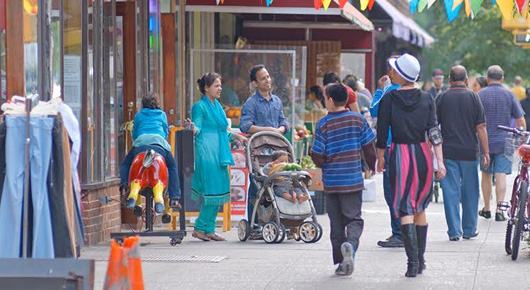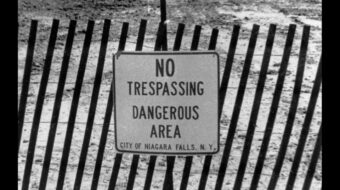
ZÜRICH, Switzerland – Diversity is the overriding theme of the three-hour directorial tour de force In Jackson Heights by Frederick Wiseman, the dean of documentary filmmakers. In Jackson Heights is an absorbing, nonfiction, fly-on-the-wall look at this unique, multi-culti community in Queens, New York City, where 167 languages are spoken.
But the diversity in this melting pot on steroids extends far beyond the linguistic – Wiseman’s behind the scenes camera reveals religions (Muslims, Hindus, Christians, Jews); ethnicities (Bangladeshis, Arabs, Indians, Blacks, Mexicans, Caucasians, Chinese and many more); ages (from children to seniors ruminating on old age); classes (small businessmen, proletarians, etc.); and there’s an emphasis on the LGBT community, in particular on transgender people.
Many of the above struggle against discrimination, and much of In Jackson Heights is devoted to activists fighting for social justice. Gays debate whether or not to continue to meet in a local synagogue and the annual gay pride parade is shown, including NYC’s liberal Mayor Bill de Blasio, the first Hizzoner to march in this yearly march. Transsexuals try to organize against police harassment and what they consider to be biased mistreatment at a Jackson Heights restaurant. Community organizers alleging that “super-rich” realtors are trying to squeeze out mom and pop shops in order to lease properties to corporate chains organize small businesspeople, who are mostly Latino.
A Hispanic shop owner grouses about the alleged corruption of city/state/federal politicians but Jackson Heights’ City Councilman appears onscreen to be very proactive and in touch with the grass roots. His office workers are shown fielding incessant complaint calls while the councilman is out and about the community, marching in the gay pride parade and so on. Much of the organizing takes place at a meeting place called “Make the Road New York.”
In Jackson Heights insightfully, sensitively captures the flavor of this startlingly variegated community composed largely of newly arrived immigrants trying to find their path toward the “American Dream.” As is Wiseman’s wont since his first documentary – 1967’s Titicut Follies, shot at the State Prison for the Criminally Insane in Bridgewater, Mass. – there is no narration in In Jackson Heights, which unfolds through the words and deeds of the ordinary people on the screen. However, sometimes Wiseman’s technique falls short, such as during a confrontation between Colombians and NYPD. Is this a case of rowdy soccer hooligans getting out of hand or of police brutality against Latinos? Your guess is as good as mine.
But this is a minor quibble: The venerable octogenarian documentarian’s 40th film may well be his magnum opus, revealing to us a community’s cosmos, with an underlying sense of faith in the American traditions of tolerance, brotherhood, sisterhood and yes, now, trans-hood in the ‘hood. E pluribus unum: With liberty and justice for ALL!
According to IMDB.com In Jackson Heights will be released Oct. 4 in the U.S.
Photo: In Jackson Heights still, 11th Zurich Film Festival.












Comments